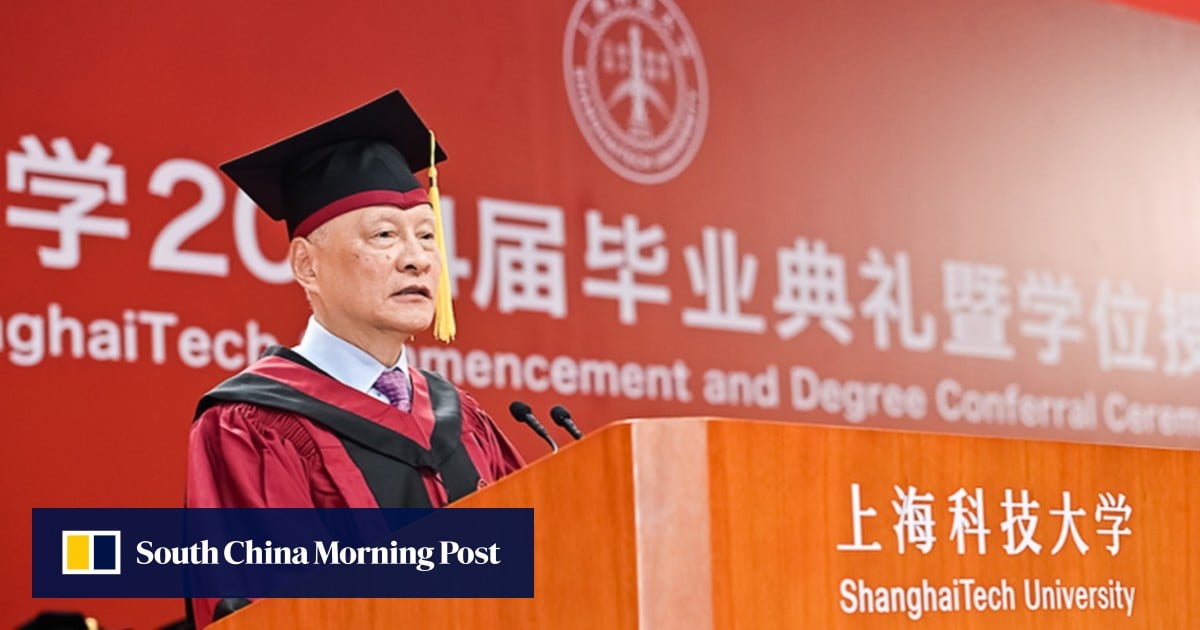China’s young people should avoid “wishful thinking” about the United States, according to Cui Tiankai, the country’s former ambassador to the US.
The veteran diplomat made the remarks at a commencement ceremony at ShanghaiTech University on Sunday, telling the graduates they should avoid oversimplifying the rise and fall of a great power or the geopolitical complexities between the two countries.
Cui, China’s longest serving ambassador to the US, warned against both an unrealistic adoration of the US or the view that America is declining and will never recover.
“Blindly worshipping the US is not a scientific or objective understanding. On the other hand, believing that the US will inevitably decline and fall into ruin is also a one-sided and absolutist view, inconsistent with reality and objectiveness,” said Cui, who served as Beijing’s envoy to Washington from 2013 to 2021.
Despite recent efforts to stabilise relations, ties between China and the US have been hit by tensions over the South China Sea and Taiwan and increasing US export restrictions on hi-tech goods such as advanced semiconductors.
He said “the US does have a lot of problems – very big problems” but pointed to its military and financial strengths, as well as its leadership in scientific and cultural areas.
A weekly curated round-up of social, political and economic stories from China and how they impact the world.
By submitting, you consent to receiving marketing emails from SCMP. If you don't want these, tick here
Cui said the development and evolution of the US is the result of combinations of various forces and factors such as the economy, politics, culture, population and natural conditions that often work in a spiral process, not a straight line.
“Our understanding of it should be comprehensive, dimensional, evolving and dialectical, rather than oversimplified, absolute, or even wishful thinking,” he said.
Cui’s remarks echoed those of some observers who have called for an objective assessment of China’s geopolitical challenges and strengths. The formula that “the East is rising and the West is declining” has gained traction among government officials and state-controlled media.
However, Cui warned that “mistaking [the weaknesses of] others can often mislead oneself. This is something we need to be vigilant about”.
He called on the graduates to make “arduous efforts” to rejuvenate the nation and form proper and independent perspectives, instead of simply echoing other opinions and gossip.
“Modernisation does not equate to Westernisation or Americanisation. Their path cannot guide us to our goals,” Cui said.
“We believe that the current trend of the international landscape is on our side, and morality and justice are also on our side. But this does not mean that we can succeed easily. China’s development has always been about surpassing ourselves, not about crushing others. But we must constantly overcome the obstacles erected by others,” Cui said.


I guess, maybe in pure output and scale of media/culture. Considering how stagnant everything is though that came as a shocking observation to me, lol
As someone working in Chinese media. It's qualitative. One of the issues is that except for the most prosperous cities, other regions in China have a hard time getting their media sectors of the ground. One reason is due to the government providing relatively lucrative, large and low effort projects, which hamper development. These projects, depending on the committee (and whether or not they want to get bribed and wait out the clock), can just be pigeonholed for months if not years, with no funding reaching these companies. In the meanwhile, these companies don't dare take on bigger projects because "what if we suddenly get the money next month and we have to start". A lot of time and opportunity is squandered, and the staff of these companies take on projects that might not be their right fit, as such you have a problem with specialization and creating task-orientated pipelines that improve quality and completion time.
There are more graduates in media than vacancies. From this year on, the majority of provinces will scrap media studies from most universities that don't have such a specialization.
The issues are systemic, and very much on the quality side of things. China's government puts too much trust in that the quality of its media and thus cultural power will rise with the same amount as their GDP does.